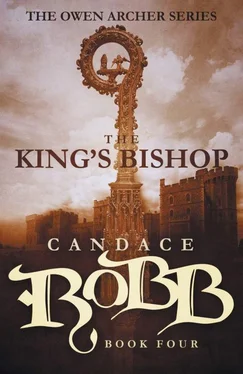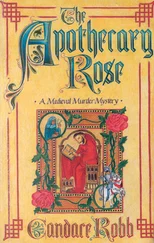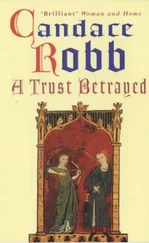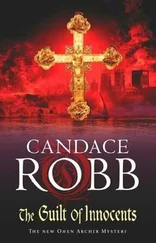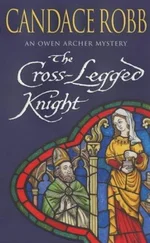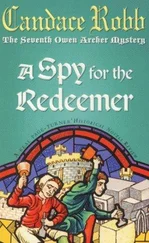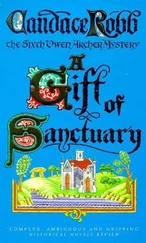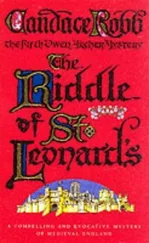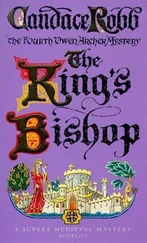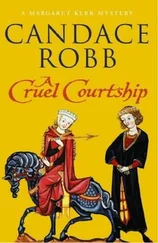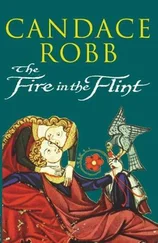Customers kept Lucie occupied for the rest of the morning. As soon as the last one strolled out she closed the shop and hurried out to see the state of the trees. Three were already replanted and staked, and Jasper was soaking them with buckets of water from a wagonload brought up earlier from the river to supplement their well water. Far in the back of the garden Owen was at work on another tree. Lucie crossed herself when she saw the fury with which he threw the dirt, stomped, yanked at the tree when it tilted. She backed out of his way as he went for the cord and stakes, sank down on the bench by the roses to wait for him to exhaust his devils. There would be time enough for him to wash himself for their guests.
And indeed, when Tildy and her sister came out to tell them it was time to dress, Owen called to Jasper to gather the tools while he joined Lucie.
She wiped Owen’s grimy face with her apron. “We must don smiles for our daughter now.”
Miraculously, Owen managed a crooked grin. “Aye. Lief would not be the cause of gloom on such an anniversary. I have done with my mourning for now.”
It was an assortment of guests that one would find only in such a household, with Owen’s standing as steward, retainer and spy, and Lucie’s as Master Apothecary and the daughter of a knight: John Thoresby, Archbishop of York; Camden Thorpe, Lucie’s guildmaster, and his wife Gwen; Tom and Bess Merchet of the York Tavern; and Lucie’s father, Sir Robert D’Arby, and his sister Phillippa. Magda Digby, who had been midwife at Gwenllian’s birth, had declined, amused that Lucie and Owen had even thought to ask her to sit at table with the Archbishop. “Magda has no mind to drink wine with the Carrion Crow, no matter that Bird-eye is his man. Magda has a longer memory than most.”
Thoresby, conspicuous in his Archbishop’s robes, offered a toast to Sir Robert, “Who in his delight at the news that his daughter was with child gave her and her worthy husband this gracious property.”
Sir Robert, who stood in the window of the new hall watching his sister fuss with the children out in the garden, bowed and held up his glass with an apologetic glance at Lucie, who had not at first been keen on his extravagant gift.
But she, too, held up her glass. “To Sir Robert.”
All toasted.
Sir Robert then stepped forward. “Let us also toast to the Lord Chancellor’s generosity in providing this splendid wine.”
“The Archbishop, Sir Robert,” Bess said. “His Grace is no longer chancellor.”
Thoresby had just returned from London, where he had handed the Great Seal and the chain of office to Wykeham.
Sir Robert scratched his thin white hair and frowned. “Ah. Now it comes back to me. My daughter did say something about it. Forgive me, Your Grace.”
Thoresby held up his cup. “No need, Sir Robert. Why should you be bothered to remember the shifting fortunes of court? Let us drink rather to Captain Archer, Mistress Wilton and my beautiful godchild.”
When they had also toasted the house, the workmen, Owen’s miraculously successful moving of the apple trees, Thoresby stepped forward once more. “And lastly, let us drink to Sir William of Wykeham, who is consecrated this day Bishop of Winchester.”
Camden Thorpe frowned. “But, Your Grace, should not the Archbishop of our great city have been included in the ceremony? How is it that you are not at St Paul’s?”
“He is well attended by the Archbishop of Canterbury and the bishops of London and Salisbury. I shall not be missed, Guildmaster.”
“But did you not wish to go?” Camden asked, a man who delighted in ritual.
“Not when it falls on the first anniversary of my goddaughter’s birth,” Thoresby said with a gentle smile.
Owen and Lucie exchanged puzzled looks.
“To the Bishop of Winchester,” Gwen Thorpe said, raising her glass.
After the toast, as the guests moved towards the gaily lit table, Bess touched Tom’s arm, and, leaning close, whispered, “’Tis a proper house for them.”
Tom looked round at the glazed casements opened to the garden, the tiled firepit in the middle of the room, the raised platform at the head of the table. He shrugged. “Too grand for me. The old kitchen was more to my liking.”
“Well, they will be glad of the extra room when the next babe comes.”
Tom glanced over at Lucie, shook his head. “Lucie is with child? She looks right slender to my eye.”
“You’ve a good eye for a tiny waist, as always, husband. But mark my words, with His Grace come home to stay there will be ample opportunity for bed sport.”
“Oh, aye.” Tom drained his glass. “Come, wife, let us join them at table before that fine roast is cold.”
Two historical threads entwine in this book: King Edward Ill’s battle to make William of Wykeham Bishop of Winchester, and Alice Perrers’s intriguing relationship with Sir William of Wyndesore. I find William of Wykeham and Alice Perrers complementary souls because of their dependence for their standing on Edward’s affection. I put this thought into the mind of John Thoresby, who balances precariously on the edge of retirement as Lord Chancellor, his close friendship with King Edward having soured over his obvious disapproval of the King’s low-born mistress. And now the King is grooming another commoner, William of Wykeham, to take Thoresby’s place. Historians have treated Wykeham with more kindness than they have Perrers, but both have come down to us with the taint of King’s favourites.
Froissart, the Flemish chronicler who resided at court at Queen Phillippa’s invitation, said of Wykeham: “… everything passed through his hands. He stood so high in the King’s favour that, in his time, everything was done in England by his consent, and nothing was done without it.” [1] Froissart Chronicles , ed. G. Brereton (London: Penguin Books Ltd, 1978), p. 67.
No doubt an exaggeration, but Wykeham did rise to become Lord Chancellor of England from a modest beginning as King’s chaplain and surveyor of the works at Windsor Castle, and it was his success with the completion of the castle that endeared him to King Edward. During this period the lower ward of the castle was largely rebuilt to house the chaplains who served St George’s Chapel. Timber buildings within the keep, or Round Tower, were rebuilt or renovated to house the royal family (chambers, a hall, and probably a chapel), whilst extensive building in the upper ward was completed. This ward, with the royal apartments and lodgings for courtiers, essentially took its present form at this time. Though modernised, enlarged, refaced over the centuries, much of what we see today stands on the foundations planned by Edward III and William of Wykeham. The work in the upper ward is described thus by the continuator of Ranulph Higden’s Polychronicon :
About the year of our Lord 1359 our lord the King, at the instance of William Wikham, clerk, caused many excellent buildings in the castle of Windsor to be thrown down, and others more beautiful and sumptuous to be set up … The said William was of very low birth … yet he was very shrewd, and a man of great energy. Considering how he could please the king and secure his goodwill, he counselled him to build the said castle of Windsor in the form in which it appears today to the beholder. [2] The History of the King’s Works, Vol. 1, The Middle Ages , ed. H. M. Colvin (London: Her Majesty’s Stationery Office, 1963), p. 877.
I mention in the book an inscription found on a wall in the castle, “This made Wickam”. [3] The spelling of names was at this time as creative an endeavour as all other spelling. The form of Wykeham’s name that I use is the one I came upon most frequently in twentieth century historical writing.
It is said that when King Edward objected to the inscription, Wykeham explained that he had not meant to take credit for the castle, but rather to acknowledge that its completion was what made his career. This story is probably a myth, but the point is well taken. Windsor was close to the King’s heart. Here it was that he had envisioned his recreation of Arthur’s Round Table. Though that early plan was aborted, it was revised as the Order of the Garter. And Wykeham had seen to it that Edward had a glorious, mighty castle in which his noble order could gather and celebrate chivalry, with a college of chaplains to serve them.
Читать дальше
